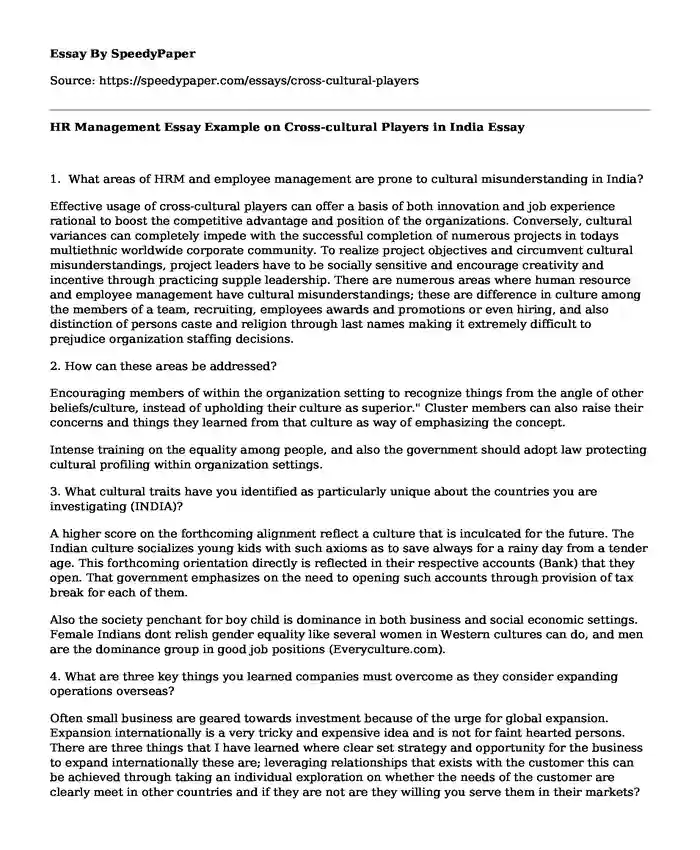
| Type of paper: | Essay |
| Categories: | Management Human resources Multiculturalism |
| Pages: | 3 |
| Wordcount: | 625 words |
1. What areas of HRM and employee management are prone to cultural misunderstanding in India?
Effective usage of cross-cultural players can offer a basis of both innovation and job experience rational to boost the competitive advantage and position of the organizations. Conversely, cultural variances can completely impede with the successful completion of numerous projects in todays multiethnic worldwide corporate community. To realize project objectives and circumvent cultural misunderstandings, project leaders have to be socially sensitive and encourage creativity and incentive through practicing supple leadership. There are numerous areas where human resource and employee management have cultural misunderstandings; these are difference in culture among the members of a team, recruiting, employees awards and promotions or even hiring, and also distinction of persons caste and religion through last names making it extremely difficult to prejudice organization staffing decisions.
2. How can these areas be addressed?
Encouraging members of within the organization setting to recognize things from the angle of other beliefs/culture, instead of upholding their culture as superior." Cluster members can also raise their concerns and things they learned from that culture as way of emphasizing the concept.
Intense training on the equality among people, and also the government should adopt law protecting cultural profiling within organization settings.
3. What cultural traits have you identified as particularly unique about the countries you are investigating (INDIA)?
A higher score on the forthcoming alignment reflect a culture that is inculcated for the future. The Indian culture socializes young kids with such axioms as to save always for a rainy day from a tender age. This forthcoming orientation directly is reflected in their respective accounts (Bank) that they open. That government emphasizes on the need to opening such accounts through provision of tax break for each of them.
Also the society penchant for boy child is dominance in both business and social economic settings. Female Indians dont relish gender equality like several women in Western cultures can do, and men are the dominance group in good job positions (Everyculture.com).
4. What are three key things you learned companies must overcome as they consider expanding operations overseas?
Often small business are geared towards investment because of the urge for global expansion. Expansion internationally is a very tricky and expensive idea and is not for faint hearted persons. There are three things that I have learned where clear set strategy and opportunity for the business to expand internationally these are; leveraging relationships that exists with the customer this can be achieved through taking an individual exploration on whether the needs of the customer are clearly meet in other countries and if they are not are they willing you serve them in their markets? Second thing is building of intellectual property thats plays major role in global expansion of a business by targeting area/regions with good past existence of Intellectual protection histories, and the third thing is linking together with the domestic partners and this can be realized through connections between the business owner and the manufacturers. Bring into line the objectives, expectations, and making visibility and transparency among partners, is very crucial (Shrm.org).
5. What makes these so difficult for companies?
What makes this so difficult is challenges like; Firstly language barrier and regulating policies of the countries identified for investment and the culture, to get competent personnel vast with above skills is very hard to find and if available can be very hard to absorb them, secondly investing substantially on energy and time by the leaders and finally the domestic success of the business does not translate to international.
References
Everyculture.com,. 'Culture Of India - History, People, Clothing, Traditions, Women, Beliefs, Food, Customs, Family'. N.p., 2015. Web. 25 Nov. 2015.
Shrm.org,. 'Human Resource Practices In India'. N.p., 2015. Web. 25 Nov. 2015.
Cite this page
HR Management Essay Example on Cross-cultural Players in India. (2019, Jun 25). Retrieved from https://speedypaper.net/essays/cross-cultural-players
Request Removal
If you are the original author of this essay and no longer wish to have it published on the SpeedyPaper website, please click below to request its removal:
- Free Essay about Human Growth and Development
- Essay Sample with a Book Report: Beyond My Control by Nancy Friday
- Essay Sample Describing the Tibetan Deep Culture
- Essay Example: Patient Safety and Patient Satisfaction in Hospitals
- Reflection Essay Sample on Business Writing
- Paper Example on Disorders of the Reproductive Systems
- Essay Sample on Product Design and Development of Exploring Business
Popular categories




